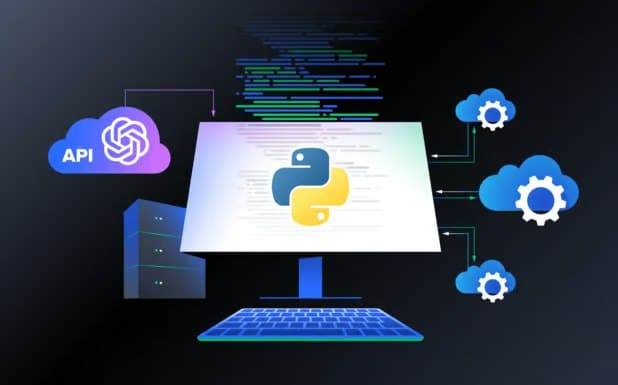Leveraging LLM APIs as Intelligent Virtual Assistants for Python Development
Python has undoubtedly become the most versatile and widely used programming language for application development. But with its increasing complexity, businesses are constantly looking for effective ways to streamline Python development.
Imagine having a co-pilot ready to assist you in your coding journey. All your complex coding tasks become simpler and save much of your time.
Well, this isn’t just an imagination anymore but a reality of Python development—all thanks to Large Language Model (LLM) APIs and AI virtual assistants.
LLM API virtual assistants have unlocked new doors for developers to streamline their development workflows, enhance productivity, and foster collaboration among development teams. These APIs can perform all sorts of tasks like analyzing sentiments, translating languages, and even writing code.
This blog sheds light on the extraordinary potential of LLM APIs as intelligent virtual assistants, exploring their importance and best practices to leverage them in python web development.
Defining LLM APIs
Large Language Models, or LLMs, are advanced AI-based systems trained on vast datasets to interpret and produce human-like text responses. These models can perform a plethora of programming language-related tasks, including code generation, debugging assistance, documentation, and even tutoring.
An LLM API (application programming interface) allows developers to integrate these models into their application development environment and leverage them as virtual assistants to enhance the productivity of their Python web development process. These assistants can then help developers streamline workflows and automate tasks.
Some widely used LLM APIs in Python development are:
- BERT, T5, Gemini, and Bard by Google
- ChatGPT-3, 4, and 4o by OpenAI
- Claude 3.5 and 3.7 Sonnet by Anthropic
- LLaMA, M2M-100, and XLM-R by Meta
Empowering Python Development with LLM APIs as Intelligent Virtual Assistants
While the LLM APIs can’t replace the creativity and problem-solving skills of Python developers, these models can provide intelligent virtual assistance, helping with routine development operations. The ultimate success of using LLM APIs lies in understanding their role and leveraging them effectively for Python development.
Let’s see how using LLM APIs as intelligent virtual assistants can empower the development process of Python applications.
Code Generation and Increased Productivity
LLM APIs as virtual assistants can easily manage repetitive operational tasks, such as generating boilerplate code or prototypes. They can also assist in coding based on natural language descriptions. This expedites the code generation process and development cycles, allowing developers to manage other complex coding tasks that require more human intelligence.
Efficient Troubleshooting and Debugging
Virtual assistants based on LLM APIs play a pivotal role in Python development by troubleshooting and debugging code and offering insightful suggestions along with potential solutions. Leveraging their knowledge base and access to relevant resources, these assistants provide timely assistance in identifying errors, optimizing code performance, and resolving issues efficiently.
Task Automation and Reduced Development Time
Automation is the key aspect of virtual assistants in Python development. LLM-powered virtual assistants automate code generation and review the code for errors. They generate comprehensive reports, label the data, and perform repetitive tasks. Task automation reduces the time and effort required for various development processes, allowing Python developers to focus on more code optimization.
Documentation Assistance
Documentation in Python development is a challenging task as it needs to be updated with every change. LLM API-based virtual assistant resolves the documentation complications instantly, relieving developers from searching through extensive results manually. Virtual assistants help in organizing and accessing documentation and provide quick answers for all the queries and complexities.
Knowledge Sharing
The records and performance databases of LLM-based virtual assistants make them invaluable for Python developers today. These assistants monitor activities and maintain records of all the previous actions. They have significant information storage capacity. This enables developers to access relevant information and ideas within development projects as they adapt to new challenges.
Personalized Assistance
An LLM-based virtual assistant can be customized based on the user’s choice. It uses personalized coding preferences and workflows to help with all tasks while considering specific Python development needs. It offers a customized coding experience by providing personalized recommendations and solutions tailored to specific project requirements.
Best Practices to Leverage LLM APIs as Virtual Assistants
Leveraging LLM APIs as intelligent virtual assistants in Python development company significantly enhances the workflow, development cycles, and code optimization. However, to get the best out of these virtual assistants in terms of efficiency, cost, and security, you must ensure you use the best practices.
Here are some of the recommended practices for using LLM-based virtual assistants in Python development:
Validate LLM-Generated Code
You must always review and test the code generated by LLM APIs before deploying it in production. You can implement automated testing frameworks to analyze the codes efficiently and identify potential issues earlier.
Optimize API Calls
Focus on minimizing unnecessary calls generated from LLM APIs to optimize costs and improve response times. As a solution, implement batching strategies and use efficient prompts to retrieve more information per request.
Secure Sensitive Data
Maintaining data security is an important consideration when using the LLM virtual assistant. Avoid sending confidential or sensitive code to LLM APIs. Use encryption and anonymization techniques to protect proprietary data during API interactions.
Leverage Caching Mechanisms
Using a caching mechanism for LLM-generated results can be an effective solution to avoid API requests that are no longer needed. You can implement a structured caching strategy to store frequently used responses for their quick retrieval.
Monitor Performance
Last but not least, you should always track the response times of LLM APIs to optimize usage, time, and cost. Set up logging and monitoring tools to analyze API efficiency and make data-driven improvements.
Importance of LLM APIs in Python Development
The problem-solving skills and capabilities of human developers to handle complex tasks remain unmatched even in today’s AI-first world. However, LLM APIs as intelligent virtual assistants in Python website development act as a powerful tool for developers, writing code for simpler and repetitive tasks.
The importance of using these LLM-based virtual assistants has grown due to the rising competition in the Python application market and the need to develop robust applications that have a faster time-to-market. And as the complexity of Python website development increases, the importance of LLM APIs will only strengthen.
Wrapping Up
The integration of LLM APIs as intelligent virtual assistants for Python development represents a significant leap forward in the world of application development. By automating repetitive tasks, enhancing code quality, and providing valuable insights, these models empower businesses to create robust applications in less time.
While there are considerations, proper implementation and best practices can maximize their benefits. As LLM technology evolves, developers can expect even more advanced features to enhance productivity and streamline development workflows. The future of AI-driven application development is here, and businesses that embrace it will gain a competitive edge in the fast-paced world of programming.




